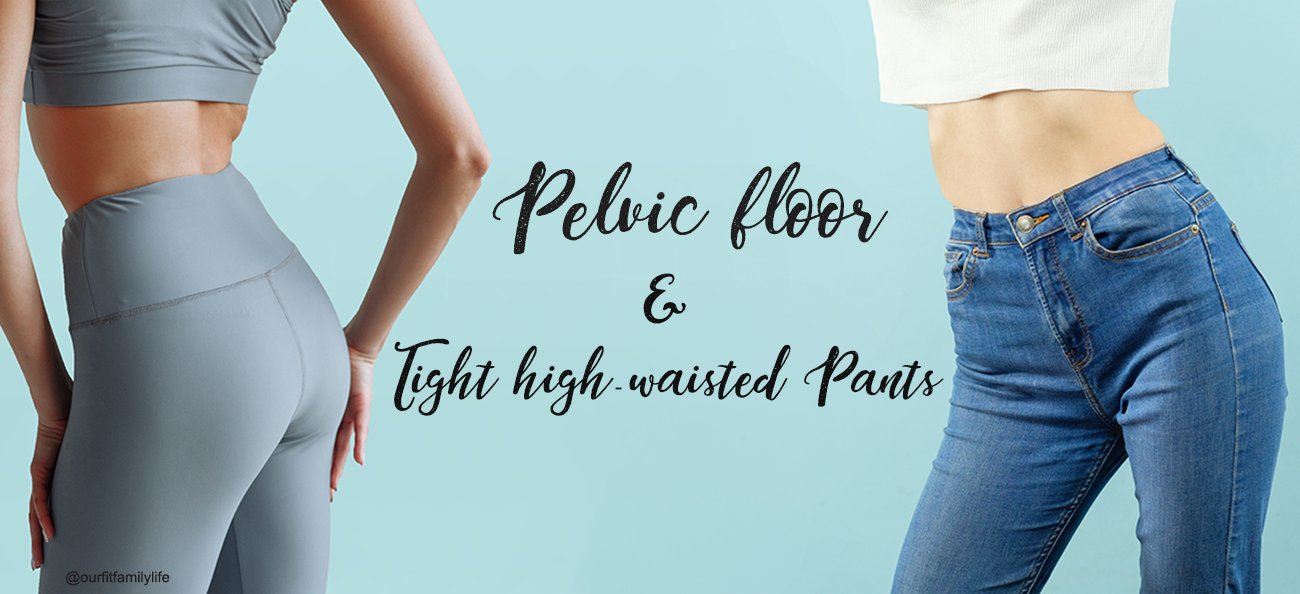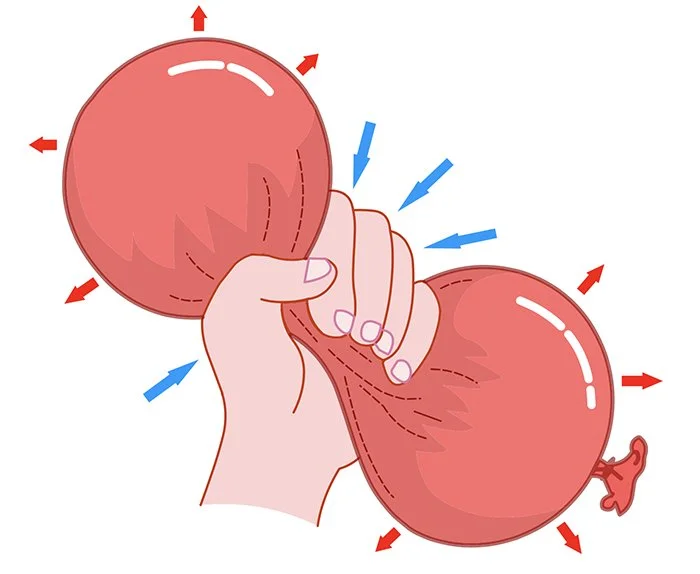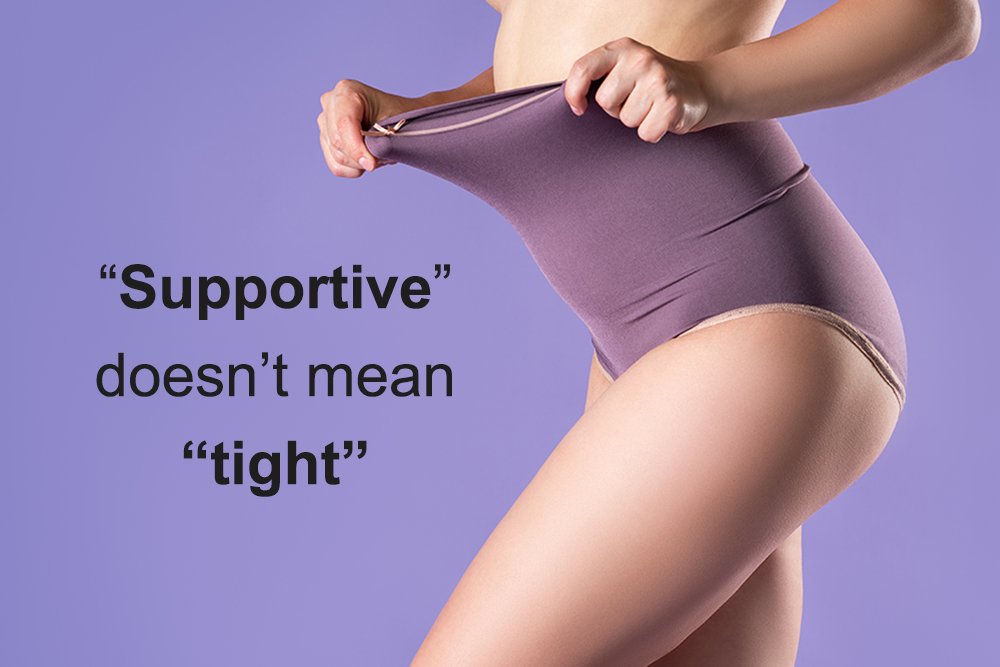Tight high-waisted leggings and jeans seem to be all the rage nowadays!
If you are a big fan of them, you may want to make a few adjustments, especially if you are concerned about the health of your core and pelvic floor.
the effects of tight high-waisted pants on your pelvic floor muscles
Having a tight waistband sends a message to your brain, telling your core muscles to “do something”.
Your core can respond to this external pressure and compression in one of two ways:
1. Sucking in
The pressure on your tummy can make you subconsciously contract your stomach or “suck in”.
When we hold our tummy in, we restrict breathing and increase the intra-abdominal pressure (pressure inside your abdomen).
This excessive and constant pressure can cause a bearing down of pressure onto the pelvic floor, forcing it to bulge down.
2. Pushing out
If you don’t tend to suck your tummy in, you may be pushing your belly out to fight the compression.
When you push your tummy out, even a little bit, it increases the downward pressure on your pelvic floor, increasing your risk of pelvic organ prolapse and leakage.
In response to this excessive pressure (regardless of if you suck in or push out):
The pelvic floor either weakens, letting the leaks and bulging happen
or fights back by getting tighter, potentially causing a hypertonic pelvic floor in the long run. When your pelvic floor muscles become too tight, they become weak and ineffective over time (making you more prone to leakage, painful sex, lower back pain, and tailbone pain).
This is only part of the problem!
The seemingly innocent act of wearing tight high-waisted clothes has a slew of consequences. Let’s dig into it!
the effects of tight high-waisted pants on your digestive and pelvic health
Wearing tight high-waisted leggings or jeans can potentially affect your whole digestive and pelvic health by:
preventing you from breathing properly (using your belly) because the waistband restricts your diaphragm's ability to move.
shutting down your inner core muscles. Since the belly can’t expand on the inhale, the belly can’t recoil back in and pelvic floor and transverse muscles (deepest abdominal muscles) can’t subtly contract on each natural exhale.
slowing down digestion because your belly can’t move freely so your abdominal organs can’t be massaged on each breath - making it difficult for gas and food to move downward.
interfering with pelvic blood flow and nerve conduction because of the constriction.
Which can in turn:
prevent inner core healing
further damage your pelvic floor
increase bloating
lead to heartburn
lead to constipation
increase low back pain
even increase stress levels!
Who knew that tight pants could have such an influence? Right!
Should You Ditch Your tight high-waisted pants?
That would be best.
All these issues don’t happen overnight and they can be reversed by re-evaluating clothing choices and fit.
Note that keeping the impact of your clothing in mind is especially important if you are still recovering from giving birth, trying to heal a diastasis recti, or working to improve your pelvic floor functions.
Your core is especially vulnerable around this time, so external pressure like constrictive waistbands can have a big impact on your recovery and healing process.
While all this can sound alarming, adjusting little things can pay big dividends for your pelvic floor in the long run!
For instance,
some of my students noticed a flare in prolapse symptoms after spending the whole day in tight high-waisted pants, and an improvement when choosing looser fitting clothes.
others improved their bloating issues by simply choosing looser clothes. Reducing their bloating issues also reduces the stress behind their ab midline, finally allowing their diastasis recti to heal!
“Supportive clothing” doesn’t mean “tight clothing”. So how tight is too tight?
faq about tight high-waisted pants
1 - “I have healed my core after baby, can tight high-waisted pants affect my pelvic floor too?”
Yes. Pressure always takes the path of least resistance… and our pelvic floor is a point of fragility because it is pierced by your vagina (which is, of course, not the case for men).
Repetitive excessive intra-abdominal pressure can be harmful as it puts stress and strain on healthy pelvic floor muscles!
This stress can affect every woman, but it’s especially important for Mothers.
Once we become Mothers, we are postpartum forever, and our pelvic floor stays a potential point of fragility.
2 - “During the immediate postpartum window, Moms are told to wear high-waisted underwear for support… so what’s the difference?”
A recent study (Okayama et al. (2019)) demonstrated that wearing supportive underwear was very beneficial for regaining healthy pelvic floor function.
“Supportive underwear” doesn’t mean “tight underwear”.
So how tight is too tight?
Let’s answer that with the next question.
3. “How tight is too tight?”
Here are a few tips to make sure your pants don’t work against your efforts.
- Do your pants leave a mark on your skin?
The answer should be “No”.
- Can you easily slip your fingers between the waistband and your skin?
The answer should be “Yes”
- When you slip your fingers between the waistband and your tummy, does it feel like your pants rest softly on your fingers, or do they feel a little constrictive?
If they feel constrictive, then your pants are too tight and put pressure on your pelvic floor as well.
4. “Aren’t tight low-waisted jeans worse?”
Wearing very tight pants, regardless of if they are high-waisted or low-waisted pants, can interfere with proper pelvic and lower limb blood flow, and nerve conduction.
Tight jeans or “skinny jeans” can become very uncomfortable and have been linked to: digestive issues, pelvic pain, vulva pain, back pain, thrush, yeast infections, excess vaginal discharge and itching in women.
5. “Julie, what do you wear?”
A lot of you may think that I wear workout clothes all day long, but I don’t!
Being an online trainer requires a lot of time writing, and sitting at my desk.
I often choose to wear clothing that allows me to move, breathe, and release my belly freely!
I spend most of my time in harem or genie pants.
I find that stretch jeans work okay for a couple of hours. Mine are not too low, not too high, but I would never want to travel, sit for an extended period, hike, or exercise with them. The perfect jeans are hard to find, and the ones that fit me may not suit you, and vice versa.
I wear leggings often too, but you may have noticed in my videos that I always flip the waist down so my belly can move freely on the inhales/exhales.
I choose my leggings according to the comfort and elasticity of the fabric.
Consider how your pants might be affecting your pelvic health
We’ve all heard the saying “Beauty is pain”, but should it be, really?
Hopefully this information will help you re-evaluate your clothing preferences and perhaps choose another size in the store.
Choosing a smaller number on the label isn’t worth sacrificing your pelvic health.
I know the size number can affect many women’s mental health, but it really shouldn’t!
It is JUST a number, it doesn’t define you, and you may even notice that your size varies from one brand to another too!
Awareness is a great place to start.
Perhaps you were wearing clothes without knowing that they could harm your pelvic health, increase your bloating, or prevent your core healing.
A little knowledge can go a long way, and it’s NEVER too late to start doing the right things for your body!
Are you ready to take advantage of the training options I offer?
Immediate Postpartum Program - From Birth to 8 weeks PP
Core Rehab Program (after 8 weeks PP) - Better Body after Baby program
Membership Program - Follow the training I use for my own fitness ($29.90/ month – no string attached)




